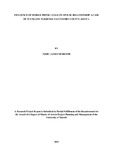| dc.description.abstract | The Economic Pillar of Vision 2030 seeks to improve the prosperity of all regions of the
country and all Kenyans by achieving a 10% Gross Domestic Product (GDP) growth rate by
2012. Promote Kenya as a Business Process Off-shoring (BPO) or IT enabled services
(previously known as business process off-shoring) destination to increase demand of BPO
services from Kenya globally. This pillar that leads to Increased ICT talent pool to meet the
increasing demand and provide a set of BPO specific incentives to attract investments cannot
be overemphasized. It comes with adoption of the mobile phone by families that have been a
global phenomenon in recent years. It is now an integral part of family members‟ daily lives
and is for the majority, the most popular form of e-communication. In fact, the mobile phone
has turned from a technological tool to a social tool. This paper explored the influence of
mobile phone on spouse relationship. Families use the mobile phone in positive ways to
organise and maintain their social networks. However, there are also negative influences on
spouse relationship. Similarly, the mobile phone has lead to changed dynamics in the family,
with issues of safety and surveillance from a parental and spouse perspective leading to
negotiated changing freedoms for family members. While functional coordination can be
beneficial for the family, other problems can arise such as financial difficulties, non-custodial
parent access, as well as over reliance on the mobile phone for safety issues and intrusion into
family lives. The influence of the mobile phone on the spouse as an institution has not
however, received as much research. Disruptions to spouse activities or events, incidences of
cheating and bullying are some of the negative impacts. While promoting social network and
improving communication for distant spouse members seems to be the only positive for the
family, further research is needed into the influences of mobile phone use on spouses. This
study used descriptive research design targeting particularly the staff, directors and members
of Tuungane Tujijenge Sacco Society Ltd in Embu and the influence of mobile phones in
their spouse relationship. It sought to meet the following objectives; to establish how
communication through mobile phone influence spouse relationships, to determine the extent
to which mobile phone money transactions influence spouse relationship, and the extent to
which use of applications on mobile phones influence spouse relationship, a case of
Tuungane Tujijenge Sacco Embu County, Kenya. The study findings showed that: 65% of
the respondents agreed that communication through mobile phones has enhanced the
relationship and families have become better but sometimes led to break up and bad
relationships; 42.4% of the respondents believed that mobile phone money transactions have
led to positive relationships, improved livelihoods and financial savings of the group
members; and 37.6% of the respondents agreed that mobile phones applications use like
photo galleries accessed on spouse mobile phone has demonstrated promiscuity and a
concern of insecurity while addiction to social media has affected spouse commitment to
spouse relationship negatively. The results will be used for more research and also to
contribute to improving family as a basic unit of the society. | en_US |

